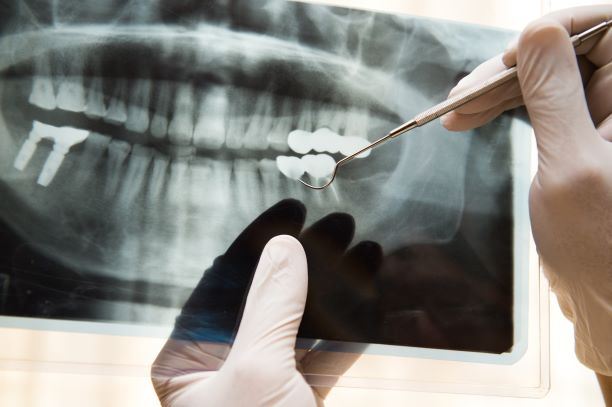Medical Malpractice Attorney Santa Clarita
Reliable Representation for Dental Malpractice Cases Across California
" "
"
Dental treatments are delicate procedures that must be handled with the utmost care and precision. One mistake can cause a slew of painful, and even potentially dangerous, oral health problems, including nerve damage.
Nerve damage can result from any sort of error, such as contact from a dental instrument, a failed dental implant, or improperly administered anesthesia. Whatever the cause of your nerve damage, the responsible party must be held accountable so that you can receive the compensation you need to heal and move on. I am a nerve damage attorney located in Santa Clarita with over 30 years of experience as a dentist, and I want to help you achieve justice. The Law Office of Dean Schweitzer is ready to fight for your rights.
Dental malpractice covers a wide range of potential issues beyond nerve damage. Common examples include misdiagnosis, delayed diagnosis, and surgical errors. Each type presents its own complexities and potential for severe impact on a patient's oral and overall health. Dental malpractice lawsuits can be challenging, requiring the evaluation of what constitutes standard care by a medical professional. With my extensive background, I am uniquely positioned to provide the comprehensive legal support you need.
Schedule a free consultation by completing our online contact form.
Handling Nerve Damage Cases with a Medical Malpractice Lawyer
After a visit to your dentist, you expect your oral health to improve, not get worse. If you recently underwent a dental procedure and notice something off with your teeth, lips, or face, you may be experiencing nerve damage caused by negligence or a mistake.
Nerves are often damaged during:
- Tooth extractions
- Root canals
- Wisdom tooth removals
- Dental implants
It is crucial to consult with a legal professional promptly if you suspect nerve damage. Documentation and expert testimony will likely be necessary to support your case, making early action vital. Carefully consider the qualifications of legal representation, particularly those with medical experience, to guide you through this complex process. Furthermore, always check the timelines for filing dental malpractice lawsuits in California to ensure your rights are preserved.
Lingual Nerve Damage Symptoms
Lingual nerve damage is nerve damage to your tongue and can result in the following symptoms:
- Loss of sensation and taste
- Pain
- Numbness
Recognizing Inferior Alveolar Nerve Damage Symptoms
Your inferior alveolar nerve provides sensation to the chin, lower teeth, lower jaw, and lower lip; damage to this nerve can cause:
- Severe pain
- Strange sensations
- Difficulty chewing or speaking
Understanding the full scope of your injuries and potential treatments is vital. This nerve controls many functions related to your face's motor skills, affecting daily activities significantly. Consulting a medical professional soon after symptoms arise is crucial for both your health and any potential legal claims. Details such as changes in your daily routine and new challenges can be instrumental in building a strong case.
Comprehending California Medical Malpractice Laws
California's medical malpractice laws are framed within the Medical Injury Compensation Reform Act (MICRA). This legislation places caps on non-economic damages, currently limiting them to $250,000. Understanding these laws helps ensure that victims of medical malpractice know their rights, including statute limitations, which often allow up to three years after the injury to file a lawsuit, or one year after the discovery of the injury. Navigating these laws requires a thorough understanding not only of the legal framework but also the complexities involved in demonstrating a healthcare provider’s negligence.
The challenge for many involved in medical malpractice cases is presenting evidence that the standard of care was breached, resulting in the injury. This often requires detailed documentation, expert testimonies, and sometimes confronting large medical institutions. At the Law Office of Dean Schweitzer, we understand the intricacies involved and provide the guidance needed to navigate such complicated legal waters. Our preparation begins with an in-depth consultation to assess the viability of your case and prepare a path forward for compensation.
Stories From Our Clients
-
I just wanted to tell you how grateful I’m for your fine kindness of replying with your phone call on August 17. I took your advice and will be seeing another dentist for a second opinion on Tuesday, August 24. I came to your website and in my readings, I see you’re an awesome Attorney, one of a kind. Once again thanks a trillion. Blessings!- Gloria A.
-
“Even though the case wasn't big enough for him to take it on, he still went out of his way to make sure that I knew there were options that I could pursue on my own.”- Jess F.
-
“Mr. Dean Schweitzer is a man of his word and does exactly what he says he will do.”- Kimberly T.
-
“Dean’s knowledge and experience as a dentist in an addition to being a lawyer were incredibly beneficial to me because he was immediately able to understand my situation.”- Current client Jamie W.
-
“I would recommend him highly to anyone who asked.”- Former client Laura P.
-
“The legal guidance and personal attention that Dean provided us was overwhelming.”- Former client Tom S.
-
“On top of being incredibly nice, he was awesome at communicating with me and always responded to my texts and emails.”- Former client Jerry P.

Mental Nerve Damage Symptoms
A damaged mental nerve can cause numbness and paralysis in the cheek and lower lip. Damage to the mental nerve can profoundly affect facial expressions and sensation. These symptoms can be distressing, making early diagnosis and treatment critical.
Understanding the immediate and long-term impacts of this type of nerve damage is necessary for evaluating any legal avenues. Patients should document all changes in functionality, relying on family or friends to notice changes they might overlook themselves.
Initiating a Lingual Nerve Damage Lawsuit
Damage to your lingual nerve can occur as a result of negligence during a dental procedure when the nerve in your tongue is damaged, resulting in loss of feeling or taste. To pursue a lawsuit, you'll need to prove the injury resulted from the operation and that the effects are long-term or permanent.
Establishing negligence in lingual nerve damage cases involves not only proving sustained harm but linking the dentist’s actions directly to the injury. Gathering evidence, such as medical records, expert testimonies, and detailed timelines of symptoms, can be vital. An experienced attorney familiar with medical malpractice law can guide you through these steps, ensuring that all possible evidence is collected and presented effectively.
Can Dental Nerve Damage Heal?
If you have suffered lingual nerve damage, you may be asking yourself what the recovery time is. Ordinarily, lingual nerve damage is temporary, and the patient will recover on their own within about eight weeks. However, if the symptoms last longer than six months, the damage will most likely be permanent.
Recovery depends on several factors, including the extent of the nerve damage and the timeliness of the initial response. Patients are encouraged to follow all prescribed treatments and regularly consult with healthcare professionals to monitor progress. Knowing when to seek further medical advice could improve potential outcomes, highlighting the importance of staying vigilant and proactive about one’s health.
Some potential treatment options for lingual nerve damage include:
- Prescription medication
- Laser treatment
- Surgical procedures
- Relaxation therapy or hypnosis
Frequently Asked Questions About Dental Malpractice
What Qualifies as Dental Malpractice?
Dental malpractice occurs when a dental care provider fails to meet the accepted standard of care, leading to patient harm. This can include errors such as improper diagnosis, poor-quality treatment, or incorrect administration of anesthesia. To determine if an action qualifies as malpractice, the complaint must demonstrate that it directly caused injury and resulted in damages. A professional evaluation often includes reviewing medical records and expert insights to validate the case.
How Can I Prove Dental Malpractice with a Medical Malpractice Attorney?
Proving dental malpractice involves several steps: first, establishing a patient-provider relationship; second, demonstrating the breach of standard care that caused the injury; and third, showing measurable harm such as additional medical bills or loss of income. Gathering supporting documents, obtaining expert testimonies, and carefully documenting symptoms and treatment progression are crucial. An attorney experienced in medical malpractice law is essential to effectively present and support your case.
What Should I Do if I Suspect Dental Malpractice?
If you suspect dental malpractice, it’s critical to collect all relevant documentation, including treatment records, billing statements, and any communication with healthcare providers. Seek a second opinion from a qualified healthcare professional to evaluate your condition and help establish a connection between your treatment and injury. Consult a medical malpractice lawyer promptly to discuss your potential case and understand your legal options.
Are There Time Limits for Filing a Dental Malpractice Suit in California?
In California, the statute of limitations for filing a dental malpractice suit is typically three years from the date of the injury or one year after discovering the injury, whichever comes first. Exceptions may exist, such as in cases involving minors or discovery of hidden harm. It’s important to consult a legal expert familiar with local regulations to ensure you file within the appropriate timeframe to preserve your rights.
What Compensation Can I Receive from a Dental Malpractice Case?
Compensation in a dental malpractice case can include economic damages, such as medical expenses and lost wages, and non-economic damages, like pain and suffering. California limits non-economic damages to $250,000 under MICRA. Working with a knowledgeable attorney can help quantify your claim and negotiate fair compensation that addresses both your financial needs and emotional distress caused by the malpractice.
-
We Provide Free Consultations
-
Hundreds of Thousands of Dollars Recovered For Our Clients
-
Client-Centered Approach
-
Real Life Experience & Knowledge
-
Personalized Attention & Care